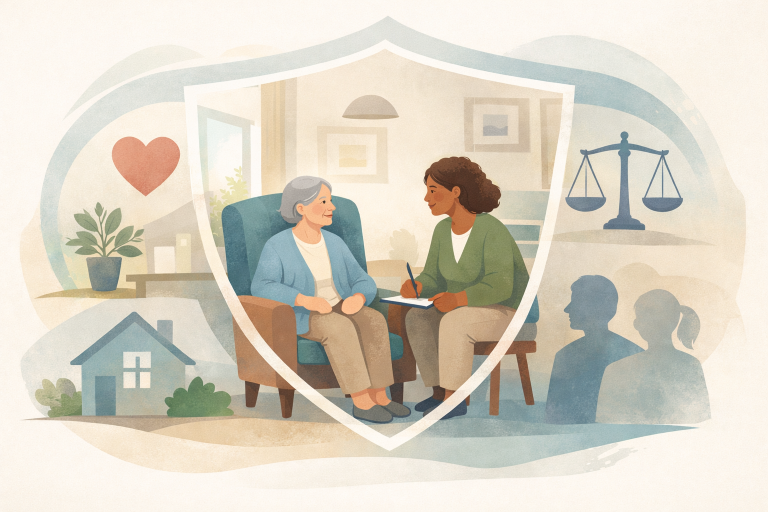When a flower blooms in the right environment, it doesn’t just grow – it thrives, revealing colours no one knew were possible.
Every person has the right to live in a safe and healthy environment that nurtures their skills, beliefs and aspirations. This is particularly important for people who might need additional care and support to achieve their goals and live fulfilled lives.
In health and social care, the concept of empowerment is often neglected as care and support is frequently focused on just satisfying people’s basic needs. When people are truly empowered, they’re more likely to experience better health outcomes that reflect not just survival, but quality of life.
Defining Empowerment in Health and Social Care
Empowerment in health and social care is about supporting people to take more control over the choices and actions that influence their own health and well-being. It means acknowledging and valuing their independence and right to make decisions throughout their care journey.
It’s about making sure people feel listened to, respected, and confident to make choices that reflect their own needs, values, and goals. This approach supports people to take an active role in their lives rather than feeling that things are simply done for them.
Empowerment strategies that follow below show how this approach can be put into practice to promote greater choice, control, and meaningful involvement in care.

Autonomy
Autonomy in health and social care is grounded in the right to self-determination – the ability for people to make informed decisions about their own lives, including their care and support. This means recognising that people are not passive recipients of care but active participants with preferences, experiences, and goals that should shape the way support is delivered. When people are supported to make choices about their own care, it strengthens their sense of dignity, independence, and control over everyday life.
Care workers play a key role in promoting autonomy by listening without judgment, offering clear and accessible information, and respecting the decisions people make – even when those decisions differ from what others might choose. Supporting autonomy isn’t just about ticking a box; it’s about building trust and respecting each person’s right to lead a life that feels meaningful to them. In doing so, care becomes more personal, respectful, and effective within the wider context of health and social care.
Choice
Choice in health and social care incorporates more than just selecting from a list of options – it involves having real influence over what happens in day-to-day life, from routines and activities to long-term goals and support arrangements. It means being able to:
- Say yes or no
- Express preferences
- Revisit decisions as circumstances change
True choice also respects a person’s right to:
- Take risks
- Try new things
- Make decisions others might not agree with
This includes choices around:
- Relationships
- Community involvement
- Cultural practices
- Personal routines
When choice is respected at every level, it supports a sense of:
- Identity
- Purpose
- Control
Access to information and options enables people to make informed decisions. Consent is an integral part of this, ensuring that decisions are made with full understanding and respect for the person’s preferences and rights.
Control
Control in health and social care means having the ability to influence the planning and delivery of services, ensuring that decisions reflect personal needs and preferences. This can involve:
- Being actively involved in setting goals and creating care plans
- Making choices about where, when, and how services are delivered
Personal health budgets offer people more control by allowing them to manage funds for their care. With a personal health budget, individuals can:
- Decide how the money is spent on services
- Tailor care and support to fit their unique needs and preferences
- Choose from a range of services, ensuring the support aligns with their values and lifestyle
This approach empowers people to take charge of their care, fostering a greater sense of independence and ownership over their health and wellbeing.
Participation
Participation in health and social care is about more than just making decisions – it’s about being at the heart of the process, ensuring care is truly aligned with one’s life and values. This means having the opportunity to:
- Contribute to meaningful discussions about what type of care feels right and supports individual goals
- Influence how services are delivered by providing input on what methods or approaches work best for them
- Be part of ongoing conversations that reflect changing needs, ensuring care remains flexible and relevant
When people actively participate in shaping their care, it’s not only about choice but also about creating a partnership where their experiences and preferences guide the direction of support. This engagement nurtures a sense of responsibility and self-worth, turning care into something that’s co-produced, not imposed – helping people feel heard and respected in ways that foster deeper connection and trust.
Why is Empowerment Important in Health and Social Care?
Empowerment in health and social care is about giving people the control, support, and information they need to make decisions that shape their lives and well-being. It’s about moving beyond the traditional care model and ensuring the individual plays a central role in their care. This can include:
- Supporting people understand their options and supporting them to make informed choices
- Tailoring care to suit personal needs, preferences, and aspirations
- Encouraging people to take an active role in managing their health, with guidance and support
When people feel empowered, they are more confident in managing their health, which leads to better physical and mental outcomes. This sense of control creates a more collaborative approach to care, where decisions are co-created with the person, ensuring their values and needs are at the heart of the process.
How to Promote Empowerment
Empowering individuals in health and social care means actively involving them in decisions about their care and support. Key strategies include:
- Shared Decision-Making: Collaborate with individuals to discuss treatment options and care plans, ensuring they are equal partners in the decision-making process.
- Personalised Care Planning: Develop care plans tailored to the individual’s needs, preferences, and goals, allowing them to have a say in how their care is delivered.
- Access to Information: Provide clear and accessible information about care options, enabling individuals to make informed choices.
- Community-Based Support: Encourage involvement in community activities and support networks to enhance social inclusion and well-being.
How Catalyst Care Group Enhances Empowerment
At Catalyst Care Group, empowerment means supporting people to take control of their own care – in ways that feel right for them. We work alongside each person to build care plans that reflect their daily routines, preferences, and long-term hopes. Support is offered in the community, close to home, where people feel most comfortable and connected.
We’ve seen this approach lead to stronger health outcomes. People feel heard, valued, and more confident in managing their own well-being. One person told us, “For the first time, I feel like decisions are made with me, not for me.”
If you’re looking for support that’s shaped around your life, we’re here to help. Contact us today!













